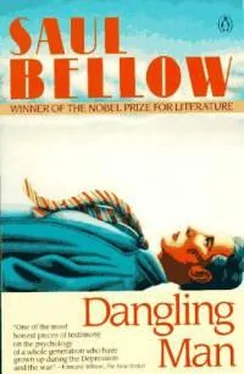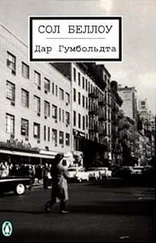Сол Беллоу - Dangling Man
Здесь есть возможность читать онлайн «Сол Беллоу - Dangling Man» весь текст электронной книги совершенно бесплатно (целиком полную версию без сокращений). В некоторых случаях можно слушать аудио, скачать через торрент в формате fb2 и присутствует краткое содержание. Жанр: Современная проза, на английском языке. Описание произведения, (предисловие) а так же отзывы посетителей доступны на портале библиотеки ЛибКат.
- Название:Dangling Man
- Автор:
- Жанр:
- Год:неизвестен
- ISBN:нет данных
- Рейтинг книги:4 / 5. Голосов: 1
-
Избранное:Добавить в избранное
- Отзывы:
-
Ваша оценка:
- 80
- 1
- 2
- 3
- 4
- 5
Dangling Man: краткое содержание, описание и аннотация
Предлагаем к чтению аннотацию, описание, краткое содержание или предисловие (зависит от того, что написал сам автор книги «Dangling Man»). Если вы не нашли необходимую информацию о книге — напишите в комментариях, мы постараемся отыскать её.
Dangling Man — читать онлайн бесплатно полную книгу (весь текст) целиком
Ниже представлен текст книги, разбитый по страницам. Система сохранения места последней прочитанной страницы, позволяет с удобством читать онлайн бесплатно книгу «Dangling Man», без необходимости каждый раз заново искать на чём Вы остановились. Поставьте закладку, и сможете в любой момент перейти на страницу, на которой закончили чтение.
Интервал:
Закладка:
The key turned, and Yanaker, with streaming eyes, stood in the doorway; the Captain passed by him into the ragged smoke. Mr. Ringholm, touching his head, complained that this was doing his hang-over no good.
"We're lucky not to be in ashes," said Mrs.
Bartlett. And now the Captain, also coughing, reappeared, dragging the chair. He and Mr.
Ringholm together carried it down. The carpet had caught fire in several places. I brought a double handful of snow from the window sill and Mrs. Briggs joined me in stamping out the sparks and wetting down the burned spots. Vanaker had fled to th bathroom, where we heard him washing, splashing in the sink.
A little later we heard Yanaker explaining: "It was a cigarette, Cap-tain. See? I put ah on the saucer. Then ah rolled off '@.
"You must be careful, old-timer," the Captain said.
"With cigarettes you must be careful. They're dangerous; cigarettes are dangerous."
"Awright, Captain."
That was our only New Year's Iggay diversion and a rather poor substitute for observing the holiday. It did give us a feeling of being set aside to let the entire day slip by. Children ran past in the morning blowing horns; in the afternoon, families in their Sunday clothes went promenading. The Captain and his wife drove off in their car early in the day and had just returned whert the fire broke out.
But what such a life as this incurs is the derangement of days, the leveling of occasions. I can't answer for Iva, but for me it is certainly true that days have lost their distinctiveness. There were formerly baking days, washing days, days that began events and days that ended them. But now they are undistinguished, all equal, and it is difficult to tell Tuesday from Saturday. When I neglect to look carefully at the newspaper I do not know what day it is. If I guess Friday and then learn that it is actually Thursday, I do not experience any great pleasure in having won twenty-four hours.
It is possible that that is one reason why I have been creating agitation. I am not sure. The circumstances at the Arrow and at Amos's house were provoking enough, but I could have avoided making scenes if I had wished. It may be that I am tired of having to identify a day as "the day I asked for a second cup of coffee," or "the day the waitress refused to take back the burned toast," and so want to blaze it more sharply, regardless of the consequences. perh, eager for consequences. Trouble, like physical pain, makes us actively aware that we are living, and when there is little in the life we lead to hold and draw and stir us, we seek and cherish it, preferring embarrassmentor pain to indifference.
January 3
A Jv. r'r'wasor; FortMr is listed as having crashed in the Pacific. His home is given as St. Louis. The Jeff Forman I knew came from Kansas City, but his family may have moved in the last few years. The name is not common; it must be the same Forman. I had heard that he was in the merchant marine. Probably he had himself transferred when the war broke out. I heard a rumor that he had been arrested in Genoa about four years ago for shouting 1 bdso in a public place.11o name, simply el basso.
Accordingto Tad, the consulate had great difficulty in gettinghim released, though nobody claimed that he had added anything to his stbasso.
Jeff was in love with excitement. he was expelled from the University for some misdemeanor or other. I never learned the facts about it. It is surprising that he was not thrown out during his first year. One night he knocked George Colin down on the street; he never tried to explain why, merely apologized to Colin before the Dean. And his inspiration for waking me early one winter morning was to throw snowballs mixed with ashes into my bed.
His rank was given in the paper as ensign; his ship was a Catalina. I suppose the submarine danger was not enough for him. I always suspected of him that he had in some fashion discovered there were some ways in which to be human was to be unutterably dismal, and that all his life was given over to avoiding those ways.
January 4
WITH ALL the respect we seem to have for perishable stuff, we have easily accustomed ourselves to slaughter. We are all, after some fashion, the beneficiaries of that slaughter and yet we have small pity for the victims. This has not come with the war, we were ready before the war ever started; it only seems more apparent now. We do not flinch at seeing all these lives struck out; nor would those who were killed have suffered any more for us, if we, not they, had been the victims. I do not like to think what we are governed by. I do not like to think about it. It is not easy work, and it is not safe. Its kindest revelation is that our senses and our imaginations are somehow incompetent.
The old Joseph who, in view of the temporariness of life, was opposed to hacking and tearing, said that he regretted that with the best will in the world one must dcal out his share of bruises '@.
Yet we are, as a people, greatly concerned with perishability; an empire of iceboxes. And pet cats are flown hundreds of miles to be saved by rare serums; and coun- try neighbors in Arkansas keep a month's vigil night and day to save the life of a man stricken at ninety.
Jeff Forman dies; brother Amos lays up a store of shoes for the future. Amos is kind.
Amos is no cannibal. He cannot bear to think that I should be unsuccessful, lack money, refuse to be concerned about my future. Jeff, under the water, is beyond virtte, value, glamor, money, or future. I say these things unable to see or think straight, and what I feel is less injustice or inhumanity than bewilderment.
Myself, I would rather die in the war than consume its benefits. When I am called I shall go and make no protest. And, of course, I hope to survive. But I would rather b a victim than a beneficiary. I support the war, though perhaps it is gratuitous to say so; we have the habit of making these things issttes of personal morality and privatewill, which they are not at all. The equivalent would be to say, if God really existed, yes, God does exist. He would exist whether we recognized him or not. But as between their imperialism and ours, if a full choice were possible, I would take ours. Alternatives, and particularly desirable alternatives, grow only on imaginary trees.
Yes, I shall shoot, I shall take lives; I shall be shot at, and my life may be taken. Certain blood will be given for half-certain reasons, as in all wars. Somehow I cannot regard it as a wrong against myself.
January @.
THIS AFTERNOON I emptied the closet of all its shoes and sat on the floor polishing them. Surrounded by rags, saddle soap, and brushes-the brown light of the streetpressing in at the windows, and the sparrows bickering inthe dead twigs-I felt tranquil for a while and, as I setIva's shoes out in a row, I grew deeply satisfied. It was aborrowed satisfaction; it was doing something I had doneas a child. In Montreal, on sdduch afternoons as this, I oftenasked permission to spread a paper on the sitting-roomfloor and shine all the shoes in the house, including AuntDina's with their long tongues and scores of eyelets. WhenI thrust my arm into one of her shoes it reached well abovethe elbow and I could feel the brush against my armthrough the soft leather. The brown fog lay in St. Dominique Street; in the sitting room, however, the stove shoneon the davenport and on the oilcloth and on my foreheadDrawing the skin pleasantly. I did not clean shoes becauseI was praised for it, but because of the work and the sensations of the room, closed off from the wet and fog of thestreet, with its locked shutters and the faint green of themetal pipes along the copings of its houses. Nothing couldhave tempted me oddut of the house. i have never found another street that resembled St. dominique. It was in a slum between a market and a hospital. I was generally intensely preoccupied with whatwent on in it and watched from the stairs and the windows. ll since then has worked upon me with such force as, eaealessay, the sight of a driver trying to raise his fallen horseOf a funeral passing through the snow, or of a cripple whotaunted his brother.
Читать дальшеИнтервал:
Закладка:
Похожие книги на «Dangling Man»
Представляем Вашему вниманию похожие книги на «Dangling Man» списком для выбора. Мы отобрали схожую по названию и смыслу литературу в надежде предоставить читателям больше вариантов отыскать новые, интересные, ещё непрочитанные произведения.
Обсуждение, отзывы о книге «Dangling Man» и просто собственные мнения читателей. Оставьте ваши комментарии, напишите, что Вы думаете о произведении, его смысле или главных героях. Укажите что конкретно понравилось, а что нет, и почему Вы так считаете.







